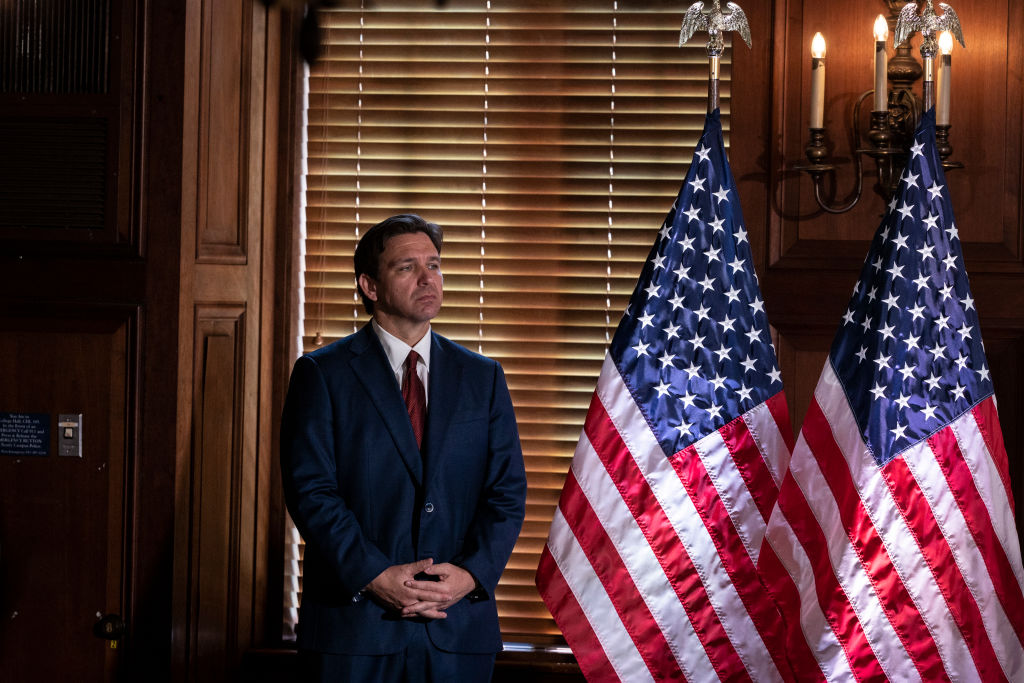We begin today with the pessimist’s credo: It’s never the wrong time to despair.
That includes a Friday before everyone’s favorite springtime holiday weekend.
In that spirit, forgive me for posing an unwelcome question. Does anything matter?
Not with respect to life or existence, I mean—although, being irreligious, perhaps I’ll write that column someday. I mean with respect to the presidential primary.
The person most likely to end Donald Trump’s reign of terror over the American right announced his candidacy this week. But he’s starting in a hole much deeper than anyone expected six months ago. And with each passing day he sounds more like Trump himself.
How much civic improvement can conservatives reasonably expect under new leadership?
Will the campaign even matter?
Let’s split the question in two. First, how likely is it that Ron DeSantis defeats Trump?
Realistically, when all is said and done, will his candidacy have mattered?
It’s been nearly two months since the governor was within so much as 25 points of Trump in the RealClearPolitics average. If we assume that his launch this week nets him 10 points after the smoke clears, he’ll still trail by more than 20 based on the latest RCP data.
That wouldn’t seem insuperable if the trendlines favored DeSantis, as all upstart candidates begin with a mountain to climb. But they do need to climb. Instead, since late March, as it became clearer that he would soon enter the race, the governor lost roughly 10 points in the average while Trump gained around the same. That’s the opposite of the groundswell of enthusiasm we’d expect for a challenger supposedly poised to dethrone a chieftain as formidable as Trump.
A few days ago Jonathan Last considered recent historical precedents in which candidates who trailed badly in a primary roared back to win. The closest analog, the one DeSantis fans fantasize about, is the 2008 Democratic contest. Can a young officeholder who’s in tune with the grassroots of his party outmaneuver an establishment frontrunner with global name recognition?
He can, it turned out.
But DeSantis isn’t Barack Obama. For one thing, Trump can’t convincingly be portrayed as “establishment” nearly as easily as Hillary Clinton could. The governor will try by tying his opponent to despised figures like Mitch McConnell and Anthony Fauci, but DeSantis accusing Trump of being “establishment” is like a disgruntled Chinese communist accusing Mao Zedong of being “establishment” circa 1960.
In both cases, you can try to accuse the guy in charge of having sold out and lost touch with the people. But good luck convincing anyone that the man who led the revolution is a squish.
And insofar as anyone in the party might be well positioned to make that argument against Trump, DeSantis isn’t the obvious choice. He made his bones politically as a member of the ancien regime, a fact his opponent is keen to remind voters of. Imagine how well Obama’s attacks on Clinton would have worked had he begun his career as a Blue Dog Democrat cheerleading the Iraq war.
There’s another glaring difference between 2008 and 2023. In both races the charisma gap is enormous, but it runs in opposite directions.
Before Trump emerged, political cultishness was defined by Obama’s first campaign. Unlike MAGA, the Obama cult wasn’t menacing; where Trump warned of “American carnage,” Obama promised “hope and change.” Both, however, inspired messianic adulation among their most ardent supporters. Partly because of his tremendous retail skill and partly because of the historic nature of his candidacy, Obama galvanized a movement. Hillary Clinton, a methodical politician, couldn’t hope to match his charisma.
That dynamic is reversed in the Trump/DeSantis race. It’s the frontrunner who has charisma to burn and a claim to history, having defied all odds to win in 2016 as a political amateur. Trump also galvanized a movement. DeSantis, a figure so uncharismatic that he writes reminders to himself to be likable, is hoping to co-opt it somehow.
Is that the stuff, realistically, of which a world-beating primary comeback is made?
Obama never trailed Clinton by as much as DeSantis trails Trump, Last notes. He never lost altitude in the polls once he’d attained it either. And needless to say, Hillary hadn’t remade her party’s base in her image before that primary the way Trump remade the modern Republican electorate before this one.
DeSantis’ approach to the race is less Barack Obama 2008 than it is Elizabeth Warren 2020, a populist who aims to wow the grassroots by promising to solve every social ill they can imagine via policy plans and aggressive use of state power. It didn’t work for her, and the left-wing base is considerably more policy-minded than the right-wing base is.
So it’s hard to imagine it working for DeSantis, a man gambling that the Trump-era GOP remains a political party more so than a cultural movement to its adherents. In a political party, offering the most attractive suite of policies is a plausible way to win the nomination. (Warren’s strategy may have failed but it wasn’t crazy.) In a cultural movement, the nomination goes to the candidate with whom the voters most closely identify, the one capable of displaying the most theatrical alpha-male bravado.
Consider the fact that Trump began to put distance between himself and DeSantis in the polls right around the time he was indicted in Manhattan, on March 30. Is that the way a political party would logically react to a criminal indictment? Or the way a cultural movement would?
Trump has presided over three disappointing election cycles in a row yet remains the frontrunner by a wide margin, one that’s grown considerably this spring. Losing elections is no obstacle to leadership in the GOP. Is that how a political party operates, or how a cultural movement does?
I don’t mean to suggest that all hope is lost. With effort, you can imagine how DeSantis might overtake Trump.
He’ll plow money into ads in Iowa, hopefully chipping away at Trump’s lead there. Prominent evangelicals will endorse him, giving their congregations “permission” to abandon Trump. The governor will strive to display dominance at the first debate, fending off attacks from the pipsqueak also-rans and explaining forcefully why he’s the only candidate who can beat Trump and Biden. As the gap in the polls begins to narrow, more Republican officeholders will find the courage to endorse him. Undecideds who prefer DeSantis on the merits will grow more confident that he can win and start tilting toward him. As Trump’s legal troubles mount, voters who prefer Trump on the merits will reluctantly conclude that DeSantis is their best shot at the presidency.
The governor will end up winning Iowa. The media will crown him, officially, as being For Real. The tectonic plates of national polling will shift overnight. In the end, DeSantis will win a long, hard-fought race.
You can imagine it. But it takes less effort to imagine how he loses.
After a small post-launch bounce, the ad barrage in Iowa fails to ignite his candidacy. He has a few stumbles on the stump, feeding the “not ready for primetime” narrative. The first debate is a debacle as attacks from the also-rans force DeSantis into a defensive crouch, letting Trump off scot-free. His polling dips, leading to a very public panic attack among the Republican establishment as well as calls to cut him loose and find a Plan B before it’s too late.
The great anti-Trump project, which might already be collapsing, collapses.
In hindsight we’ll wonder if, realistically, there was anything DeSantis could have done to break Trump’s stranglehold on the base. Did anything matter?
Let’s say the governor does somehow defeat Trump, though. That brings us to the second “does anything matter?” question.
Is there anything he might say or do that would cost him the support of traditional conservatives in the general election?
I concede that he’s worth supporting in the primary on “Anyone But Trump” grounds, at least until some other candidate demonstrates that he’s better positioned to slay the dragon. For all his faults, DeSantis has never masterminded a coup attempt, lacks a feral cult of personality eager to do his bidding, and tends to avoid conspiracy theories as a framework for understanding the world.
But why would a classical liberal strongly prefer him in a general election? Why not wash one’s hands of him and the Democrat and opt not to vote?
Listen to his latest pledge to his populist fan base. (Or read the transcript.) I understand why a conservative would prefer an authoritarian by ambition to an authoritarian by conviction, as Trump is, when forced to choose. I can’t fathom why a conservative would prefer to be governed by one enough to vote for him in November.
DeSantis is smart and slippery in his answer so his desire to pardon some January 6 convicts is carefully caveated, but to dwell on the conditional nature of what he said is to miss the forest for the trees. Because his chances of becoming president depend so heavily on appeasing the right’s illiberal bloc, he’ll have no choice once in office but to contrive a reason to issue some of the pardons he describes. He’s in hock to populism’s worst elements and he’s proven repeatedly—I won’t list all of them but you’ll find a few here—that he’s willing to pander to them in pernicious ways to keep them in his corner against Trump.
On its merits, his case for pardons is idiotic. If defendants are being let off easy for riots unconnected to the insurrection, that’s not an argument for letting guilty parties who wrecked the Capitol off the hook. It’s an argument for taking action to make sure those other defendants are properly prosecuted. Only in the modern Republican Party could a candidate maintain that if their miscreants go free, ours should too and still semi-seriously pretend to support “law and order.”
But it’s not supposed to make sense. It’s supposed to straddle the line between the two camps of DeSantis’ base, the post-liberal populists (he might pardon the J6ers!) and the traditional conservatives (he’s not absolutely committing to pardoning the J6ers!). The fact that his pardon-dangling might incentivize further violence is a secondary concern. That’s how it’ll be throughout a DeSantis presidency, forever be half-pregnant with authoritarianism—and only half if we’re lucky. Given his appetite for lib-owning, he might end up carrying to term.
Many conservatives who should know better seem unconcerned. As usual, it falls to Liz Cheney to supply moral clarity.
What’s the conservative argument against that?
Even Nikki Haley, normally a spineless political weathervane when it comes to Trump, managed to muster the courage to contradict him about January 6. “It was not a beautiful day, it was a terrible day, and we don’t ever want that to happen again,” she said last week in Iowa, responding to something Trump said during his CNN town hall. “I don’t know enough about each individual [rioter] but that’s my rule: If you break the law, you pay the price. And so I think that’s the way we need to look at it.”
Should we prefer DeSantis’ comments about pardons to Haley’s? If not, between his stance on insurrectionists, his anti-vaxxism, his willingness to defy the Constitution by not extraditing Trump, and his blatant retaliation against Disney for its political opinions, how much illiberalism are conservatives willing to tolerate in the name of holding the right together before it becomes too much?
Our friend David French is another right-winger with a gift for clarity. Unsurprisingly, he grasps the stakes of a DeSantis presidency. “More than anyone else in the race,” he writes of the governor, “he has the potential both to defeat Trump and to end conservatism as we have known it.”
That explains why populists are enthusiastic about him, and also why it’s confounding that many traditional conservatives insist on hand-waving away his authoritarian excesses as though they’re venial sins on the order of favoring a slightly higher marginal income tax rate. Ask them what they think of his illiberal tendencies and you’re apt to get some perfunctory throat-clearing (“I dislike his policy on Disney, of course, but …”) rather than meaningful engagement on what it would mean to have DeSantis-style populism as the new mode of “respectable” right-wing politics.
And so I repeat the question: Does anything matter? Is there any position DeSantis could take to render himself unfit for the presidency in the eyes of conservatives, if still more fit than Trump?
If the governor concludes that he needs to embrace Trump’s theory that the 2020 election was rigged in order to win the primary, should that too be forgiven on grounds that he’s simply doing what needs to be done to unite the right behind him? (Some might think so.) If so, all manner of ruthlessness in office could conceivably be excused for the same reason. “President DeSantis isn’t behaving illiberally because he wants to. He’s behaving illiberally because if he didn’t it would break the party.”
A Twitter pal put it well. If renouncing authoritarianism would break the party, that’s not an argument for tolerating authoritarianism. It’s an argument for renouncing the party.
Bottom line: We’re going to learn some things from this primary about the right.
First we’ll learn whether populists prefer an upstart candidate with a thought-out program to wage culture war on “institutional arrangements dedicated to American decline,” in Matthew Continetti’s words, to a boorishly charismatic conspiratorial caudillo. “What if the Republican base really likes Trump?” Nicholas Grossman wondered recently. “Not tolerates him as a vehicle for conservative policies, but likes him for the reasons elites don’t?”
Then, perhaps, we’ll learn whether traditional conservatives support DeSantis because he’s the most viable Trump alternative at the moment or, however loath they are to admit it, because they’ve developed a taste for post-liberal abuses of power at the left’s expense.
What if the traditionally conservative base really likes DeSantis? Not tolerates him as a vehicle for dethroning the orange menace, but likes him for the reasons true classical liberals don’t?
Maybe they’re more like Trump voters than they’d care to admit. If Tim Scott, a perfectly likable small-government ideologue, makes a move in the polls that suggests he might be the most viable Trump alternative after all and DeSantis’ conservative support doesn’t budge, we’ll have our answer.
And maybe David French has been too optimistic. A two-man race between Donald Trump and Ron DeSantis in which both candidates enjoy enthusiastic rather than grudging support seems like it already means the end of conservatism as we’ve known it. To all appearances, traditional conservatives will impose no penalty on an illiberal Republican nominee in a general election provided his name isn’t “Donald Trump.”









Please note that we at The Dispatch hold ourselves, our work, and our commenters to a higher standard than other places on the internet. We welcome comments that foster genuine debate or discussion—including comments critical of us or our work—but responses that include ad hominem attacks on fellow Dispatch members or are intended to stoke fear and anger may be moderated.
You are currently using a limited time guest pass and do not have access to commenting. Consider subscribing to join the conversation.
With your membership, you only have the ability to comment on The Morning Dispatch articles. Consider upgrading to join the conversation everywhere.